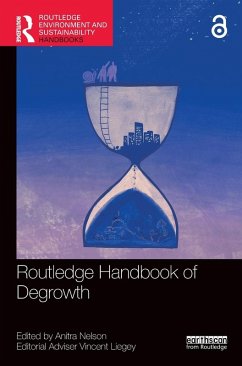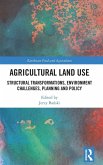Routledge Handbook of Degrowth
Herausgeber: Nelson, Anitra
Routledge Handbook of Degrowth
Herausgeber: Nelson, Anitra
- Gebundenes Buch
- Merkliste
- Auf die Merkliste
- Bewerten Bewerten
- Teilen
- Produkt teilen
- Produkterinnerung
- Produkterinnerung
This handbook takes stock of 'degrowth', a concept and movement, gaining increasing visibility in the 2020s. Contributors explain contexts for degrowth's significance, elaborate its diverse history and detail its unique approaches, practices, challenges and potential futures.
Andere Kunden interessierten sich auch für
![Routledge Handbook of Agricultural Biodiversity Routledge Handbook of Agricultural Biodiversity]() Routledge Handbook of Agricultural Biodiversity304,99 €
Routledge Handbook of Agricultural Biodiversity304,99 €![Routledge Handbook of Wetlands Routledge Handbook of Wetlands]() Routledge Handbook of Wetlands282,99 €
Routledge Handbook of Wetlands282,99 €![Sustainable Development Goals and UN Goal-Setting Sustainable Development Goals and UN Goal-Setting]() Stephen BrowneSustainable Development Goals and UN Goal-Setting52,99 €
Stephen BrowneSustainable Development Goals and UN Goal-Setting52,99 €![Social and Economic Benefits of Protected Areas Social and Economic Benefits of Protected Areas]() Social and Economic Benefits of Protected Areas72,99 €
Social and Economic Benefits of Protected Areas72,99 €![Agricultural Land Use Agricultural Land Use]() Agricultural Land Use172,99 €
Agricultural Land Use172,99 €![Policy Conflicts in Post-Mao China Policy Conflicts in Post-Mao China]() John P. BurnsPolicy Conflicts in Post-Mao China60,99 €
John P. BurnsPolicy Conflicts in Post-Mao China60,99 €![Environmental Movements of India Environmental Movements of India]() Krishna MallickEnvironmental Movements of India124,99 €
Krishna MallickEnvironmental Movements of India124,99 €-
-
-
This handbook takes stock of 'degrowth', a concept and movement, gaining increasing visibility in the 2020s. Contributors explain contexts for degrowth's significance, elaborate its diverse history and detail its unique approaches, practices, challenges and potential futures.
Produktdetails
- Produktdetails
- Verlag: Routledge
- Seitenzahl: 532
- Erscheinungstermin: 17. Juli 2025
- Englisch
- Abmessung: 250mm x 175mm x 33mm
- Gewicht: 1087g
- ISBN-13: 9781032645247
- ISBN-10: 1032645245
- Artikelnr.: 73491278
- Herstellerkennzeichnung
- Libri GmbH
- Europaallee 1
- 36244 Bad Hersfeld
- gpsr@libri.de
- Verlag: Routledge
- Seitenzahl: 532
- Erscheinungstermin: 17. Juli 2025
- Englisch
- Abmessung: 250mm x 175mm x 33mm
- Gewicht: 1087g
- ISBN-13: 9781032645247
- ISBN-10: 1032645245
- Artikelnr.: 73491278
- Herstellerkennzeichnung
- Libri GmbH
- Europaallee 1
- 36244 Bad Hersfeld
- gpsr@libri.de
Anitra Nelson is an activist scholar and Honorary Principal Fellow at the Informal Urbanism Research Hub (InfUr-), University of Melbourne (Australia). Among numerous degrowth publications, she is co-editor of Housing for Degrowth: Principles, Models, Challenges and Opportunities (2018) and Food for Degrowth: Perspectives and Practices (2021) collections, and co-author of Exploring Degrowth: A Critical Guide (2020). See https://anitranelson.info/ Vincent Liegey is an engineer, interdisciplinary researcher and lecturer on degrowth. He has co-authored several books on degrowth including Exploring Degrowth: A Critical Guide (2020, Pluto Press), and Décroissance, Fake or Not (2022, Tana Editions). He is one of the coordinators of the international degrowth conferences and of Cargonomia, a centre for research and experimentation on degrowth in Budapest.
Part I. The current growth conjuncture 1. Degrowth has come of age 2.
Fossilised metabolism: The social ecology of capitalist growth 3. Unequal
uses of Earth 4. Capitalist crisis and affective alternatives Part II.
Degrowth: Origins and steppingstones 5. The French origins and pillars of
degrowth 6. Degrowth in Italy: Early beginnings, political disputes and a
plural social movement 7. Postwachstum: German roots and currents of
degrowth 8. A Catalan way towards degrowth 9. Accidental degrowth
practices: Illustrations from Czechia 10. Greece: Real-existing degrowth
and its challenges 11. Degrowth' and the implications of English language
hegemony 12. Latin American indigenous perspectives meet degrowth 13.
Degrowth in an African periphery: From necrocapitalism to a pluriverse of
nowtopias Part III. Degrowth practices: Concepts in action 14. Conviviality
and commoning 15. Autonomy and freedom in individual to societal
transformation 16. The degrowth doughnut 17. Frugal abundance: Meaning in
practice in an Icelandic village 18. Defining defashion: A manifesto for
degrowth 19. Degrowth: Health and healthcare 20. Holistic care economies:
Degrowth ways of provisioning and the Global East 21. The pedagogy of
degrowth and the political ecology of technology 22. Mapping the spectrum
of degrowth work 23. Reimagining collaboration: Degrowth practitioners,
scholars and activists Part IV. Degrowth futures: Perspectives and
strategies 24. Twenty years of degrowth: What has been achieved? 25. Roles
of utopian thought in a degrowth transformation 26. Growth, degrowth and
poverty reduction 27. Imperial and solidary modes of living: Alternatives
to eco-imperialism 28. Prefigurative degrowth politics: Decolonisation and
the nonaligned movement 29. Ecofeminist and decolonial feminist degrowth
futures 30. Fostering degrowth in men: Beyond masculinity and the gender
binary 31. Degrowth, urbanisation and spatial planning 32. Degrowth-aligned
commoning organisations 33. Ecosocialism and degrowth 34. Beyond growth:
Beyond divisions 35. Degrowth: Future research directions
Fossilised metabolism: The social ecology of capitalist growth 3. Unequal
uses of Earth 4. Capitalist crisis and affective alternatives Part II.
Degrowth: Origins and steppingstones 5. The French origins and pillars of
degrowth 6. Degrowth in Italy: Early beginnings, political disputes and a
plural social movement 7. Postwachstum: German roots and currents of
degrowth 8. A Catalan way towards degrowth 9. Accidental degrowth
practices: Illustrations from Czechia 10. Greece: Real-existing degrowth
and its challenges 11. Degrowth' and the implications of English language
hegemony 12. Latin American indigenous perspectives meet degrowth 13.
Degrowth in an African periphery: From necrocapitalism to a pluriverse of
nowtopias Part III. Degrowth practices: Concepts in action 14. Conviviality
and commoning 15. Autonomy and freedom in individual to societal
transformation 16. The degrowth doughnut 17. Frugal abundance: Meaning in
practice in an Icelandic village 18. Defining defashion: A manifesto for
degrowth 19. Degrowth: Health and healthcare 20. Holistic care economies:
Degrowth ways of provisioning and the Global East 21. The pedagogy of
degrowth and the political ecology of technology 22. Mapping the spectrum
of degrowth work 23. Reimagining collaboration: Degrowth practitioners,
scholars and activists Part IV. Degrowth futures: Perspectives and
strategies 24. Twenty years of degrowth: What has been achieved? 25. Roles
of utopian thought in a degrowth transformation 26. Growth, degrowth and
poverty reduction 27. Imperial and solidary modes of living: Alternatives
to eco-imperialism 28. Prefigurative degrowth politics: Decolonisation and
the nonaligned movement 29. Ecofeminist and decolonial feminist degrowth
futures 30. Fostering degrowth in men: Beyond masculinity and the gender
binary 31. Degrowth, urbanisation and spatial planning 32. Degrowth-aligned
commoning organisations 33. Ecosocialism and degrowth 34. Beyond growth:
Beyond divisions 35. Degrowth: Future research directions
Part I. The current growth conjuncture 1. Degrowth has come of age 2.
Fossilised metabolism: The social ecology of capitalist growth 3. Unequal
uses of Earth 4. Capitalist crisis and affective alternatives Part II.
Degrowth: Origins and steppingstones 5. The French origins and pillars of
degrowth 6. Degrowth in Italy: Early beginnings, political disputes and a
plural social movement 7. Postwachstum: German roots and currents of
degrowth 8. A Catalan way towards degrowth 9. Accidental degrowth
practices: Illustrations from Czechia 10. Greece: Real-existing degrowth
and its challenges 11. Degrowth' and the implications of English language
hegemony 12. Latin American indigenous perspectives meet degrowth 13.
Degrowth in an African periphery: From necrocapitalism to a pluriverse of
nowtopias Part III. Degrowth practices: Concepts in action 14. Conviviality
and commoning 15. Autonomy and freedom in individual to societal
transformation 16. The degrowth doughnut 17. Frugal abundance: Meaning in
practice in an Icelandic village 18. Defining defashion: A manifesto for
degrowth 19. Degrowth: Health and healthcare 20. Holistic care economies:
Degrowth ways of provisioning and the Global East 21. The pedagogy of
degrowth and the political ecology of technology 22. Mapping the spectrum
of degrowth work 23. Reimagining collaboration: Degrowth practitioners,
scholars and activists Part IV. Degrowth futures: Perspectives and
strategies 24. Twenty years of degrowth: What has been achieved? 25. Roles
of utopian thought in a degrowth transformation 26. Growth, degrowth and
poverty reduction 27. Imperial and solidary modes of living: Alternatives
to eco-imperialism 28. Prefigurative degrowth politics: Decolonisation and
the nonaligned movement 29. Ecofeminist and decolonial feminist degrowth
futures 30. Fostering degrowth in men: Beyond masculinity and the gender
binary 31. Degrowth, urbanisation and spatial planning 32. Degrowth-aligned
commoning organisations 33. Ecosocialism and degrowth 34. Beyond growth:
Beyond divisions 35. Degrowth: Future research directions
Fossilised metabolism: The social ecology of capitalist growth 3. Unequal
uses of Earth 4. Capitalist crisis and affective alternatives Part II.
Degrowth: Origins and steppingstones 5. The French origins and pillars of
degrowth 6. Degrowth in Italy: Early beginnings, political disputes and a
plural social movement 7. Postwachstum: German roots and currents of
degrowth 8. A Catalan way towards degrowth 9. Accidental degrowth
practices: Illustrations from Czechia 10. Greece: Real-existing degrowth
and its challenges 11. Degrowth' and the implications of English language
hegemony 12. Latin American indigenous perspectives meet degrowth 13.
Degrowth in an African periphery: From necrocapitalism to a pluriverse of
nowtopias Part III. Degrowth practices: Concepts in action 14. Conviviality
and commoning 15. Autonomy and freedom in individual to societal
transformation 16. The degrowth doughnut 17. Frugal abundance: Meaning in
practice in an Icelandic village 18. Defining defashion: A manifesto for
degrowth 19. Degrowth: Health and healthcare 20. Holistic care economies:
Degrowth ways of provisioning and the Global East 21. The pedagogy of
degrowth and the political ecology of technology 22. Mapping the spectrum
of degrowth work 23. Reimagining collaboration: Degrowth practitioners,
scholars and activists Part IV. Degrowth futures: Perspectives and
strategies 24. Twenty years of degrowth: What has been achieved? 25. Roles
of utopian thought in a degrowth transformation 26. Growth, degrowth and
poverty reduction 27. Imperial and solidary modes of living: Alternatives
to eco-imperialism 28. Prefigurative degrowth politics: Decolonisation and
the nonaligned movement 29. Ecofeminist and decolonial feminist degrowth
futures 30. Fostering degrowth in men: Beyond masculinity and the gender
binary 31. Degrowth, urbanisation and spatial planning 32. Degrowth-aligned
commoning organisations 33. Ecosocialism and degrowth 34. Beyond growth:
Beyond divisions 35. Degrowth: Future research directions








